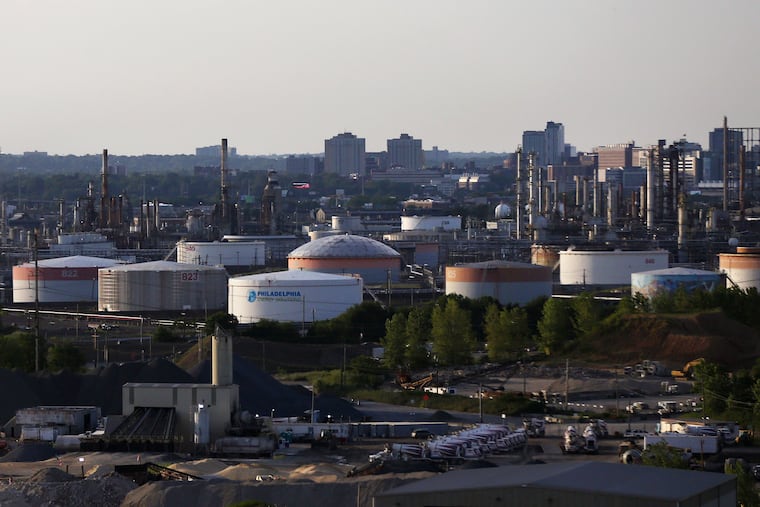The public should weigh in on South Philly refinery cleanup plan | Opinion
Philadelphia residents only have until January 14 to demand a complete investigation into the refinery that exploded in 2019.

Philadelphia residents only have until January 14 to demand a complete and accurate investigation of environmental contamination at the former Philadelphia Energy Solutions refinery in South Philadelphia.
Evergreen Resources Group, a subsidiary of Sunoco, is responsible for investigating soil and groundwater contamination in the site and remediating it. Evergreen prepared a series of technical reports years ago without first obtaining public comments. These reports are incomplete and insufficient. The public has a chance to ask for them to be strengthened – through a public comment period ending this week.
» READ MORE: What contamination lurks on — and under — shuttered South Philly refinery
Evergreen has proposed a site-specific standard for the amount of lead permitted in soil that is more than twice the statewide health standards for non-residential sites. This would not be protective of public health, allowing regulatory agencies to require Evergreen to address lead contamination on a much smaller fraction of the site than it would otherwise have to with better standards. The water table, or the top of shallow groundwater beneath the site surface, is higher in some areas (in some parts, less than ten feet from the surface). Evergreen’s proposed site-specific standard does not adequately consider the health risks of exposure to groundwater polluted by lead in the soil, especially considering that the deep groundwater is a source of drinking water in New Jersey.
Seven years ago, the Pennsylvania Department of Environmental Protection (DEP) disapproved a report for the deep groundwater under the refinery site in part because Evergreen did not completely evaluate the ways that humans could potentially be exposed to pollutants from the site through the groundwater. Rather than responding to this issue in time for the current comment period, Evergreen plans to fragment the investigation by delaying its full analysis to a future report that will be made available for public comment later this year. But the current work cannot be evaluated until all analysis about the aquifers is completed. Without that information, the public does not have all of the information to evaluate decisions on soil and groundwater sampling.
On the other hand, if DEP approves the current reports prematurely, that may limit the scope of public comments on later reports related to the same issues. In addition, in its reports, Evergreen does not provides meaningful evaluation of a steel wall that is the last line of defense against the migration of contaminated groundwater toward the adjacent Schuylkill River.
Evergreen also failed to adequately consider the impacts of climate change in its reports. The Schuylkill River is anticipated to experience sea level rise of two feet by 2050, which is important in determining the nature and extent of the contamination in this investigation. This is important because there is widespread lead contamination in the surface soils. Evergreen is attempting to delay a discussion of climate change to a separate report later this year.
Another concern about the environmental investigation is that it did not include Per- and Polyfluoroalkyl Substances (PFAS), a group of toxic man-made chemicals found in foams used for firefighting. These chemicals accumulate in the environment and the human body. Studies indicate that PFAS may lead to adverse health outcomes in humans, including developmental effects and cancer. As there is a history of catastrophic fires at the refinery, Evergreen should revise the reports to include chemicals in the PFAS group in its environmental investigation. Since DEP is expected to finalize a proposal to establish statewide cleanup standards for PFAS, it should also make them a part of the South Philly refinery investigation.
» READ MORE: What should happen to the South Philly refinery site? Community voices weigh in. | Opinion
The reports open for public comment are at least three years old and may not necessarily reflect current site conditions. While Evergreen has made available semiannual groundwater reports through the first half of 2020, those are not explicitly open for comment. Evergreen should have synthesized the materials in those reports with those up for comment, to bring everything up to date in a meaningful way.
Nearby residents have suffered from pollution from this site for long enough. They have long advocated for environmental justice. There should be a thorough and accurate plan for identifying contamination so that the refinery site can be properly remediated. Residents should demand that the DEP and Evergreen make public health the top priority during the cleanup of the site. Public comments can be submitted through the Clean Air Council’s form via cleanair.org/phillyrefinery, or directly to Evergreen by emailing phillyrefinerycleanup@ghd.com.
Joseph Otis Minott, Esq., is executive director and chief counsel of Clean Air Council.